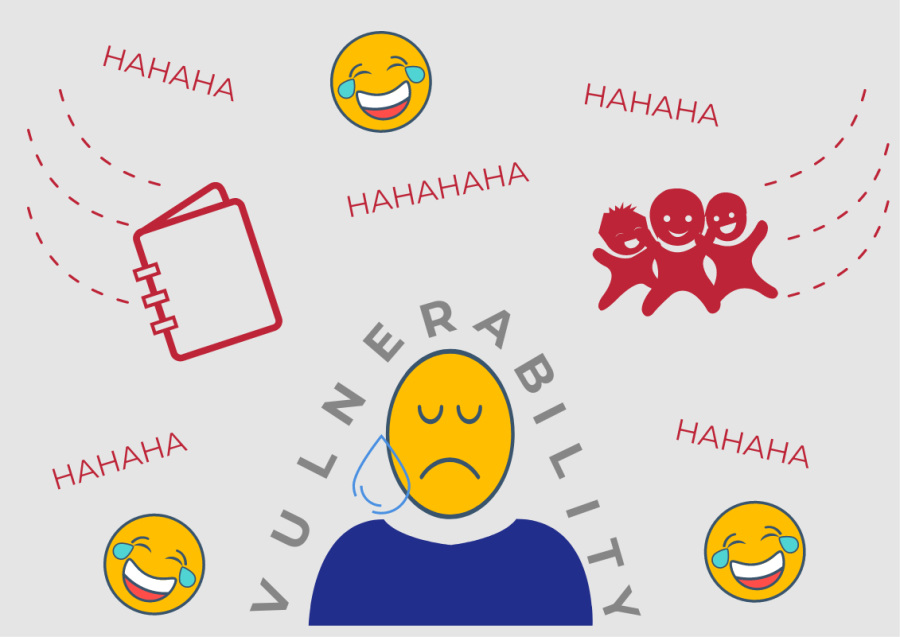Embodying Vulnerability
Why does being vulnerable make people feel so uncomfortable?
Being vulnerable is one of the most difficult things to do.
Navigating the social aspects of high school is hard. People can make friendships one day, and then break them some days later. People can be peer pressured into making horrible decisions. They can feel left out by others purposely. On top of all of this, people have school and homework to deal with, which is already stressful enough. These different parts of a high schooler’s life can make them feel vulnerable. But is vulnerability really a bad thing?
According to merriam-webster.com, the definition of the word vulnerable is to be “capable of being physically or emotionally wounded”. It’s a simple definition, but it holds so much depth to it. No one wants to be physically or emotionally hurt. When someone is, it’s difficult for them to open up to others without thinking that they’re making a fool of themselves. They don’t want to bother other people with their problems or worries.
Mark Manson from markmanson.net gave another reason as to why people don’t want to be vulnerable: “[They] haven’t exercised or groomed [themselves] to the extent that [they] could because [they] didn’t want to stand out too much.”
When someone is experiencing vulnerability, the idea of standing out is their worst nightmare. Standing out can bring out someone’s vulnerability even more, and this is something that a vulnerable person doesn’t want.
Mrs. Collison, one of our counselors at Westminster, explained another aspect as to why being vulnerable is really hard, especially with teenagers: “I don’t know that we have a good culture of trust building. People want to be vulnerable […] but they also watch teenagers interact. They see them talking about things with each other and think, ‘I don’t wanna risk putting myself out there, knowing that that person could use it against me.’”
Mrs. Patton, another one of our counselors, adds on to Collisons’ ideas: “It’s risky. Teenagers are still learning and figuring out who they are, so there’s a lot of insecurity in that. Part of the reason why vulnerability is so hard is we may have chosen the wrong person to be vulnerable with, and then we get burned.”
A lot of people in society consider the emotions that come with being vulnerable to be bad. They think that talking about emotions and feelings with others is showing weakness which people shouldn’t show to others. But is it a weakness?
Brené Brown, an American researcher, doesn’t think like this. She believes that people being vulnerable is good for our mental health. Dan Schawbel from forbes.com had an interview with her, where she explained her thoughts on being vulnerable and her experience with vulnerability. In it, she explained how the fear of vulnerability can mess with peoples’ minds:
“When we’re fueled by the fear of what other people think or that gremlin that’s constantly whispering ‘You’re not good enough’ in our ear, it’s tough to show up. We end up hustling for our worthiness rather than standing for it.” However, she later explains how people are tired of hiding from their vulnerability: “…I think people are tired of the hustle—they’re tired of doing it and tired of watching it.”
It’s fantastic to see that society’s perspective on being vulnerable is starting to change. Goodtherapy.org mentions another one of Brown’s beliefs that “one’s vulnerability signifies courage and strength rather than weakness.” If someone is vulnerable to others, it shows how strong they are to convey their emotions even when they are terrified to do so.
Lisa Fritscher from verywellmind.com gives a list of the positive things that can come about when people open up to others. They explain that being vulnerable can be a “greater strength”, it can bring about “stronger relationships”, and it can “improve self-acceptance.”
Collison gave her opinion about ways that people can start to become more vulnerable with others: “You can baby step what you share. You can start off with small things that if you did reveal them then it could help you and the other person, but it might not damage you.”
Patton also gave her opinion about the small steps that one can make in order to become more vulnerable with others: “Knowing that you are seen, known, and loved by God is a really important part about being vulnerable.” Patton mentioned that “picking safe people [to share things with] and going slow with sharing are also important steps to becoming more vulnerable.”
As Christians, having the idea that God is there to listen and never judge is really helpful with becoming vulnerable with others, and it is something that people sometimes forget.
Being vulnerable is hard. Being vulnerable is scary and stressful, especially as a teenager. However, being vulnerable is ok. By being more vulnerable with others, people can change the way society thinks about vulnerability for good.




